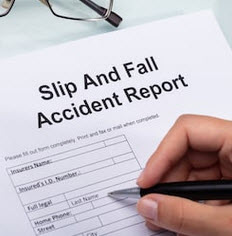Based on media reports, most people think the leading causes of emergency room visits are car crashes, gunshot wounds, or drug overdoses. But that distinction, or lack of distinction, goes to slip-and-fall injuries. These incidents account for over 8 million visits a year. Some are falls from a height, while others are surface fall injuries.
Fall victims often sustain serious or fatal injuries, especially if they have pre-existing injuries or other adverse conditions. As a result, a Brandon slip and fall attorney may be able to obtain substantial compensation in these claims. This compensation usually includes money for economic losses, such as medical bills, and noneconomic losses, such as pain and suffering.
Like many other things in life, a successful claim for slip-and-fall damages always rests on a strong foundation, as outlined below.
Duty of Care in a Slip-and-Fall Claim
Landowners almost never plan for people to slip and fall when they visit their homes or businesses. We all cause accidents from time to time, and we must all accept the consequences of the accidents we cause.
In Florida, these consequences depend on the relationship between the victim and landowner. State law divides fall victims into three categories based on this relationship;
- Invitee: These individuals respond to the owner’s express or implied invitation. That could be an “open for business” sign or a specific social invitation. Furthermore, the owner receives an actual or potential benefit. Window-shoppers are a good illustration. These people are always invitees even if they do not buy anything and the owner received no direct benefit.
- Licensees: If there s no close relationship, either in terms of the invitation or the benefit, the victim is probably a licensee. For example, the guest of an apartment tenant is probably a licensee. The property owner may not know about the licensee’s visit, and the owner certainly does not benefit as a result of that visit,
- Trespassers: This pejorative term really just means someone that has no permission to be on the land and whose presence does not benefit the landowner. SOme exceptions, such as the frequent trespasser doctrine, may apply.
These categories are important because they determine the legal duty, if any, the owner had toward the victim.
If the victim was an invitee, the owner had a duty of reasonable care. This duty includes a responsibility to frequently inspect the property and make sure that it is safe. Reasonable care is the standard legal duty in most negligence cases.
Licensees are another story. In these cases, owners only have a duty to warn about latent (hidden) defects. These defects not only include things like loose stairway rails, but also defectively designed staircases or a lack of slip-proof mats in a produce section.
Generally, owners owe no duty to trespassers. The stories regarding injured burglars who sue homeowners are typically urban legends.
Knowledge in a Slip-and-Fall Case
The degree of the relationship means a lot with regard to duty. But it’s almost completely irrelevant with regard to knowledge, which is the second part of the foundation. The landowner must know about the dangerous condition, and victim/plaintiffs may use direct or circumstantial evidence to establish such knowledge.
Direct evidence usually means a restroom cleaning report or another “smoking gun.” Brandon personal injury attorneys usually uncover these items during discovery. Direct evidence claims are easy for jurors to understand. They simply need to listen to the evidence and apply the law.
Circumstantial fall evidence usually involves the time-notice rule. A piece of lettuce on a grocery store floor is a good example. If the lettuce was crisp and green, it probably just fell on the floor. The owner could not have known about it. But if the lettuce was dry and wilted, it had probably been on the floor for a while. The owner should have sent someone to pick it up and make the area safe.
Rely on Diligent Attorneys
A solid foundation is the key to a successful slip-and-fall claim. For a free consultation with an experienced personal injury lawyer in Brandon, contact Reed & Reed, Attorneys at Law. We have four area offices (St. Petersburg, Lakeland, Tampa, and Clearwater).
Resource:
nfsi.org/nfsi-research/quick-facts/
https://needreed.com/obtaining-compensation-after-a-florida-nursing-home-fall/

